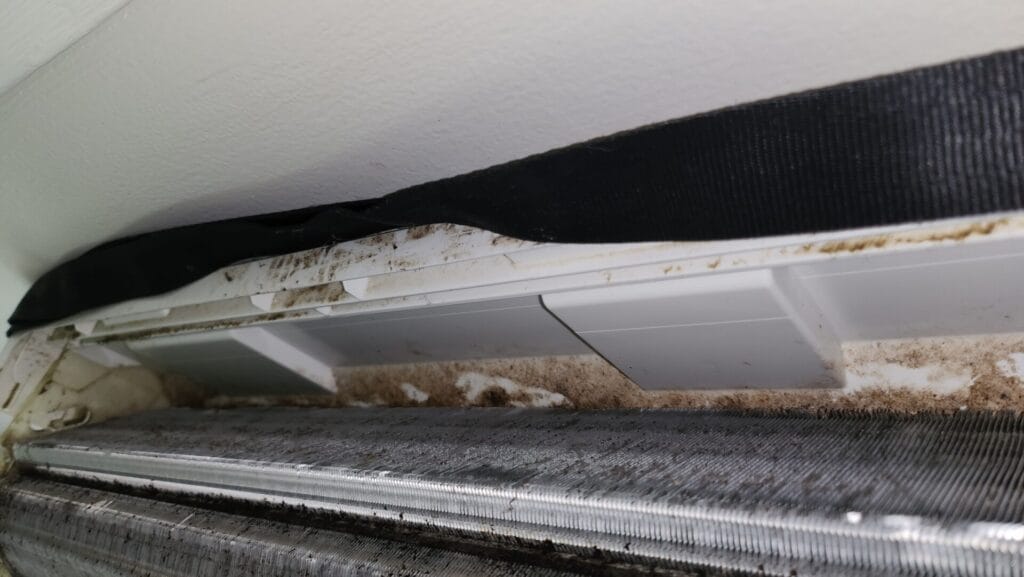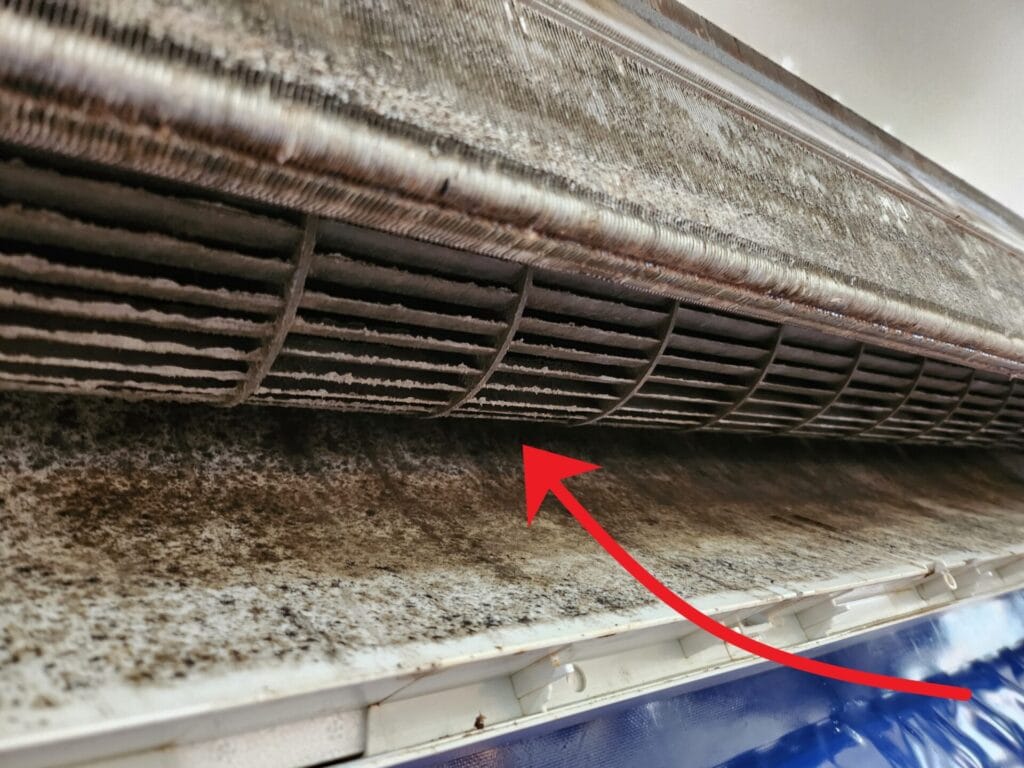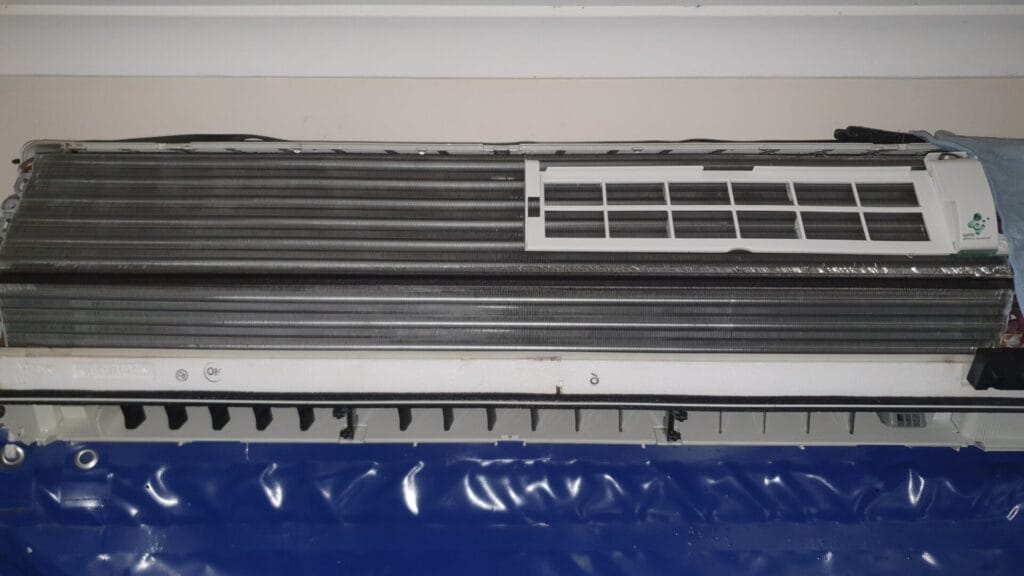By Spotless Clean Air Services – 31/05/2025

Mould doesn’t knock on the door. It silently moves in, finding refuge deep within the shadows of your air conditioner. While your AC cools the air, mould in air conditioner units may be multiplying inside, circulating spores throughout your home or office. Left unchecked, this biological growth can degrade air quality, trigger health problems, and reduce system efficiency.

Mould is a form of fungus that reproduces through lightweight spores. These spores are microscopic and capable of floating through the air unnoticed. When they land on a suitable surface, particularly one that’s moist and rich in organic material, they begin to grow and spread.
Mould thrives in damp, dark environments with limited airflow. It requires moisture, warmth, and nutrients, typically found in household dust, skin particles, and pet dander. Air conditioners, particularly those with standing condensation or clogged drainage, provide ideal conditions for rapid mould colonisation.
As air is cooled by your AC, it releases moisture in the form of condensation. This water often collects in the drip tray or on internal surfaces, creating the perfect damp zone for mould growth, especially if drainage is blocked or slow. This promotes the growth of mould in air conditioning systems.
Air conditioners pull in airborne particles, including pollen, dust, and organic debris. Over time, this detritus accumulates inside the unit, serving as a buffet for hungry mould spores. Without thorough cleaning, these deposits become breeding grounds for mould in air conditioners.

Wall-mounted units are notorious for harbouring hidden mould, particularly in the fan barrel, evaporator coil, and behind the plastic casing. Their enclosed design makes contamination hard to spot and harder to remove without disassembly. This design flaw allows mould in an air conditioner to thrive unnoticed.
Ducted air conditioners can spread mould spores through an entire building. If mould is present in one section of ductwork, every connected room risks exposure. Moisture-laden ducts or poorly insulated return air pathways are common sources of mould in air conditioning units.
These compact systems often lack proper drainage and can retain moisture after prolonged use. They’re frequently overlooked when it comes to maintenance, making them particularly susceptible to undetected mould build-up and eventually black mould in AC units.
One of the earliest signs is you might see black, green, or white specks around the vents, behind filters, or inside the coil housing. In more advanced cases, you will notice a musty, sour, or “wet sock” smell when the AC is running. There are clear indicators of mould inside air conditioning units.
If household members experience sneezing, eye irritation, coughing, or respiratory discomfort, especially when the AC is on, mould from air conditioners could be the hidden trigger. Prolonged exposure may worsen asthma or cause recurring sinus infections, a condition linked to mould in air conditioner illness.

Mould spores are highly allergenic. Even low-level exposure can cause nasal congestion, skin irritation, throat inflammation, and asthma flare-ups. Sensitive individuals may experience severe reactions requiring medical attention due to mould in air conditioning.
Some mould species produce mycotoxins, chemical compounds that can impair lung function and suppress immune response. Chronic exposure from air conditioner mould may contribute to neurological symptoms, fatigue, or immune hypersensitivity syndromes.
As mould colonises internal AC components, spores are dispersed with every cycle. These airborne particulates settle on furniture, enter lungs, and linger on surfaces, steadily degrading indoor air quality. This is one of the most overlooked dangers of mould in the air conditioner.
Mould acts as an insulating barrier on critical components like coils and fans, impeding heat exchange and airflow. This forces the system to work harder, raising energy consumption and shortening equipment lifespan. This is often the hidden cost of having black mould in air conditioning units.
Most mould growth occurs deep within areas that cannot be reached without partially dismantling the unit. Filter cleaning alone doesn’t reach the coil, blower wheel, or drain channel where air conditioner mould tends to originate.
Consumer-grade sprays and wipes lack the potency and reach of commercial solutions. They may mask odours temporarily but leave behind viable spores. In some cases, improper cleaning can actually disturb and spread colonies. AC unit mould cleaning should be done properly with a specialised air conditioner mould cleaner or AC mould cleaner.
Trained technicians disassemble the unit, exposing internal surfaces and components. Using pressurised coil flushes, fan barrel tools, and vacuums, they remove all biological residue and contaminants that have built up inside, eliminating black mould in AC units at the source.
After physical removal, professionals apply hospital-grade antimicrobials or biocides. These substances neutralise remaining spores and create a protective film to inhibit regrowth. Proper mould in air conditioner unit treatment restores safe airflow and cleanliness.

Routine inspections and cleans, ideally once a year for regular domestic use and biannually for high traffic, high use or dusty/dirty environments. Catch early signs of mould and ensure all components remain clear of debris. Neglecting maintenance allows moisture, dust, and spores to accumulate unchecked, increasing the risk of mould in the air conditioning unit.
Keep indoor humidity below 60 percent using dehumidifiers, especially in humid climates. Good ventilation, exhaust fans in wet areas, and regular filter cleaning also help deter mould in air conditioning systems from taking hold.
If mould has invaded foam insulation, wiring channels, or duct linings, complete removal may not be feasible. In such cases, replacement of contaminated parts or the entire system may be the only viable solution to completely eliminate mould in air conditioning.
Units over a decade old are more prone to contamination due to worn seals, degraded insulation, and declining performance. Replacing them with modern, mould-resistant systems prevents future outbreaks and improves air quality.
Mould in air conditioners is more than an inconvenience. It’s a health hazard hiding in plain sight. It affects the air you breathe, the efficiency of your cooling system, and the wellbeing of everyone under your roof. Preventive care, professional AC unit mould cleaning, and proper moisture control are essential for a healthy, functional home. Eliminate mould in air conditioner units and safeguard your indoor environment today.
